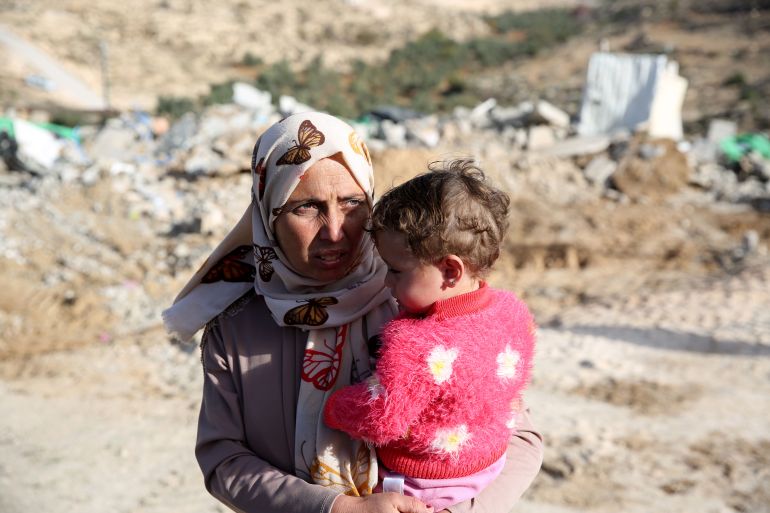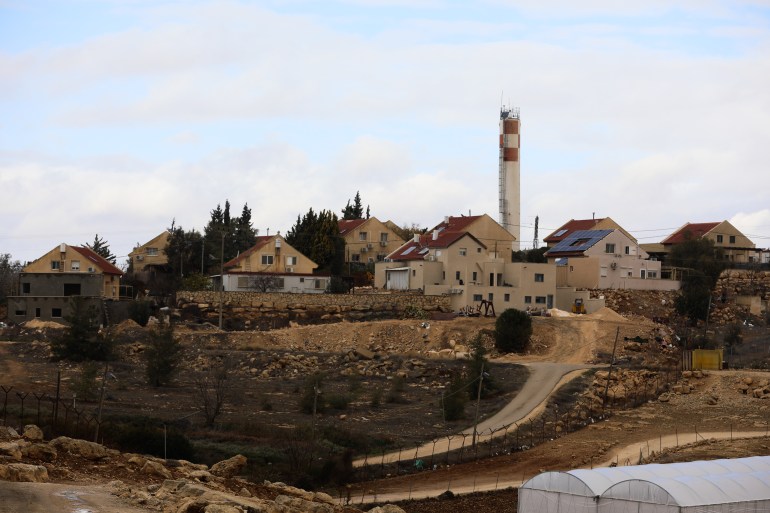Palestinian villagers in Masafer Yatta face immediate expulsion
Palestinian residents of Masafer Yatta, in the occupied West Bank, have been told they will be displaced imminently.

The Israeli army has informed Palestinian officials of their imminent plans to forcibly displace more than 1,000 Palestinian residents, including some 500 children, in the Masafer Yatta area of the southern occupied West Bank, according to human rights organisations and Palestinians in Masafer Yatta.
The Israeli High Court of Justice (HCJ) had green-lit the plan in May 2022, in a decision that concluded a legal battle the residents waged for more than 20 years against their displacement.
Keep reading
list of 3 items‘Why should I leave?’: Palestinian Bedouins decry expulsion
UN experts say mass eviction of Palestinians a possible war crime
Residents say they expect their forced displacement and the demolition of their homes at any moment after the plans emerged on Monday.
“They may come without notice – they may isolate each village and displace them one by one, or they may carry out mass displacement at once. We don’t know,” Nidal Younis, head of the Masafer Yatta Village Council, told Al Jazeera.
“In the last period, especially after the court decision, they paralysed the movement of people in this area,” continued Younis. “There are villages with checkpoints at their entrances, and only residents of the area are allowed to enter and exit,” he added, noting that the army has held up residents for up to 12 hours in the past.
The forcible transfer of protected residents – defined by the Geneva Convention as “civilians who find themselves in the hands of a party to the conflict of which they are not nationals” – in occupied territory is classified as a war crime under international law.
According to the Israeli human rights organisation B’tselem, Israel has offered Masafer Yatta residents “alternative locations” to live in.
B’tselem commented that the offer was meaningless. “Forcible transfer of protected persons in occupied territory is a war crime,” the organisation said. “It is a violent threat that leaves the residents with no choice.”
The situation in Masafer Yatta has garnered international condemnation. Let’s take a closer look:
What is Masafer Yatta?
Masafer Yatta is a semi-desert region located in the southern district of Hebron in the Israeli-occupied West Bank.
It is home to some 2,500 Palestinians distributed across 12 villages or hamlets, spanning approximately 30,000 dunams (7,000 hectares).
Masafer Yatta falls in the 60 percent of the occupied West Bank designated as “Area C”, under full Israeli military and administrative rule.
Many of the families lived there prior to Israel’s occupation of the West Bank in 1967. They make their living as shepherds and farmers but face a myriad of Israeli military policies including restrictions on maintaining and developing their homes, and an inability to access the electricity grid and water network.
They are also surrounded by a belt of illegal Israeli settlements and live under what human rights organisations call systematic Israeli police, army and settler violence.

Why is Israel trying to force them out?
In the 1980s, Israel classified most of Masafer Yatta as a closed “firing zone” to be used for military training purposes, termed Firing Zone 918.
Since 1967, Israel has designated some 18 percent of the occupied West Bank as closed military training or firing zones, rendering more than 6,000 Palestinians “illegal” residents in their own homes.
In 1999, Israeli forces expelled all the residents in Masafer Yatta on the grounds that they were living there “illegally” and had not been permanent residents, despite most residents having documents proving their ownership of their lands.
A few months after the expulsion, they were permitted to return “temporarily” after an interim injunction from an Israeli court, and have fought for their right to remain on their lands since then.
The Israeli military regularly demolishes Palestinian homes and infrastructure in Masafer Yatta, and conducts training in and around the villages, including with live ammunition and tanks, exposing residents to injury or death.
What if you woke up in the morning to find that your home became a field for training ammunition and firearms, army tanks pass through your village, bombs are fired next to your children's school, and warplanes are flying and landing over your head.
Here's #MasaferYatta pic.twitter.com/WzCn2AUmdO— Ali Awad Eye on Masafer Yatta (@Ali_awad1998) June 23, 2022
What has the reaction been like so far?
Younis, the head of the Masafer Yatta village council, told Al Jazeera the residents “have made a decision to remain in their homes”.
“People are steadfast in their villages and will not leave. The actions of the occupation don’t mean anything to them,” he added.
Israel just said they'll evict our 14 villages in Masafer Yatta, kicking 1,000+ people, most of them children, from their homes – in "short time". The ethnic cleansing of my community, Masafer Yatta, is one of the first moves Israel's new far right government is making. URGENT pic.twitter.com/YPxrICz55W
— #SaveMasaferYatta (@basel_adra) January 2, 2023
An international digital campaign was launched last year by activists and action groups in Palestine and abroad under the hashtag #SaveMasaferYatta, in the hope of drawing attention to the imminent risk facing the residents and pressuring Israel to cease displacement efforts.
The Israeli military trainings that began today in Masafer Yatta are an ethnic cleansing strategy — a way of taking over Palestinian land and making life unlivable for the Palestinians who have inhabited it for centuries. 🧵#SaveMasaferYatta pic.twitter.com/OI9cC3f45f
— Jewish Voice for Peace (@jvplive) June 21, 2022
Human rights groups and the international community have also responded.
The United Nations said in a statement that Masafer Yatta faces “imminent risks of forced evictions, arbitrary displacement and forcible transfer, in serious breach of international humanitarian and human rights laws”.
“By upholding this policy to drive Palestinians out of Masafer Yatta, the Israeli judicial system has given carte blanche to the Israeli Government to perpetuate the practice of systematic oppression against Palestinians,” the UN said on May 16.
Tor Wennesland, the special coordinator for the Middle East peace process, called on Israel at a meeting of the UN Security Council last month “to end the demolition of Palestinian-owned property, prevent the possible displacement and eviction of Palestinians and approve plans that will enable Palestinians to build legally and address their development needs”.
International rights group Amnesty International said: “[D]enying Palestinians a home is a pillar of Israel’s system of apartheid.”
The Palestinian Authority, which governs limited parts of the occupied West Bank, said the demolitions would be a “flagrant violation of international law”.